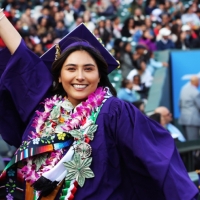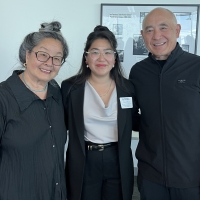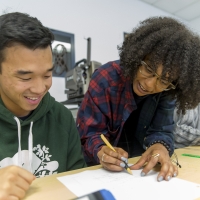Angela Tafur, First Kirkeberg Scholar, Leads with Purpose
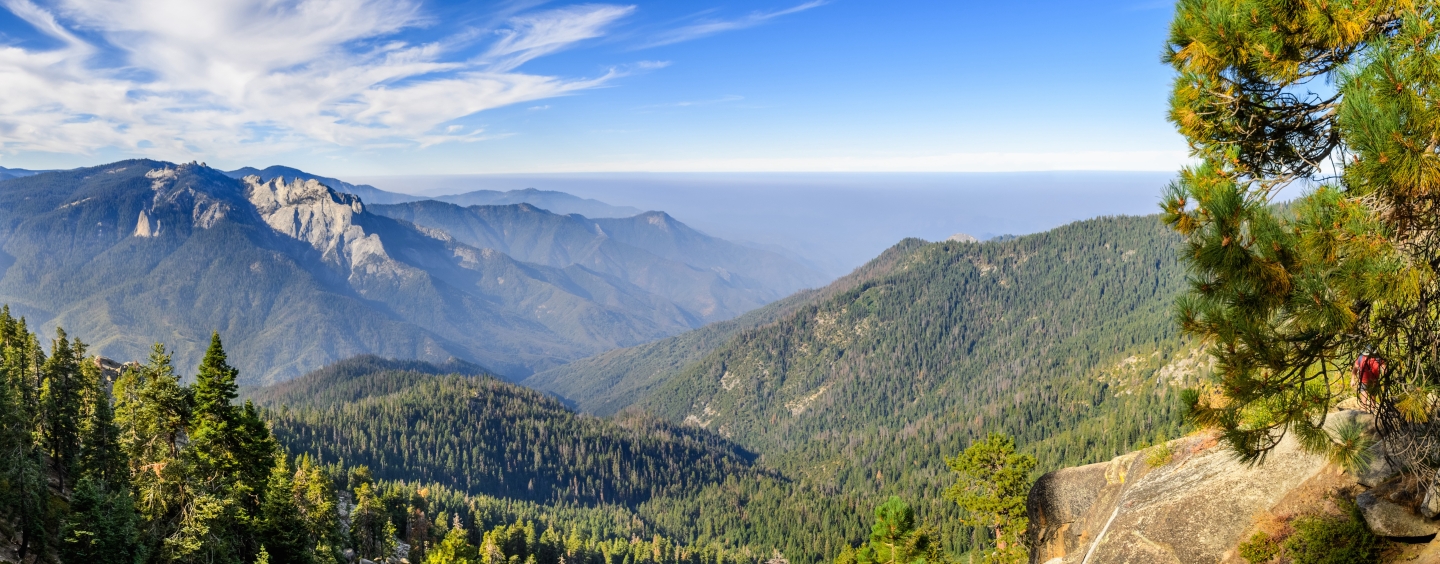
Angela Tafur, a geography major inspired by her Peruvian heritage, is the inaugural recipient of the Max Kirkeberg Scholarship and is expanding access to outdoor education and environmental justice at San Francisco State University
Fueled by the deep roots of her Peruvian parents who emigrated to the Bay Area and who taught her the value of connectedness to the environment, Angela Tafur is on a clear path to making her dream of community service a reality.
A native of Hayward who grew up in Castro Valley and is now a geography major at SFSU, Angela knew even before she went to college that she wanted to devote her professional energies to improving communities. As the first recipient of the Max Kirkeberg Scholarship, she is well on her way to making her mark in the lives of others, connecting them to and drawing strength and connectedness from the environment.
“I believe my deep interest in ecosystems was shaped early on by my parents’ influence,” says Angela. “As Peruvians, their connection to the natural world is rooted in a culture where nature and daily life are deeply intertwined — especially given Peru's diverse geography and rich array of ecosystems.
“My father is from the northern Peruvian Amazon, from a small town called Huambo, located about two hours from the culturally significant Andean town of Chachapoyas. Growing up, he would often share his extensive knowledge of local birds and plants with me, sparking my curiosity and appreciation for biodiversity,” Angela says. “He always referred to other living beings as if they were relatives or other people. My perspective and passion for the environment has been shaped by the traditional ways of life that my dad lived through and that long defined this region.”
"Growing up in the Bay Area, I carried with me stories from my family that instilled a deep connection to nature.”
—Angela Tafur
Anegla’s mother grew up in the bustling capital of Lima, but became familiar with many Peruvian cultural nature stories and medicinal plant knowledge that she passed on to Angela.
“Growing up in the Bay Area, I carried with me stories from my family that instilled a deep connection to nature,” says Angela. “However, I quickly realized that the way people engaged with the outdoors in California — through camping, summer camps, or scouting — was very different from my family's perception or experiences with nature. As immigrants, neither of my parents were familiar with these modes of outdoor recreation.”
Angela recalls a special moment outdoors with her father that instilled a deep connection to nature. “I’ll never forget the moment my father tearfully hugged a redwood tree in Reinhardt Redwood Regional Park, in awe of its beauty and gratitude for its existence amidst historic loggings in the area,” she says. “Experiences like this made me reflect on how culture, background, and access shape our relationships with nature and the area that we visit or reside in.”
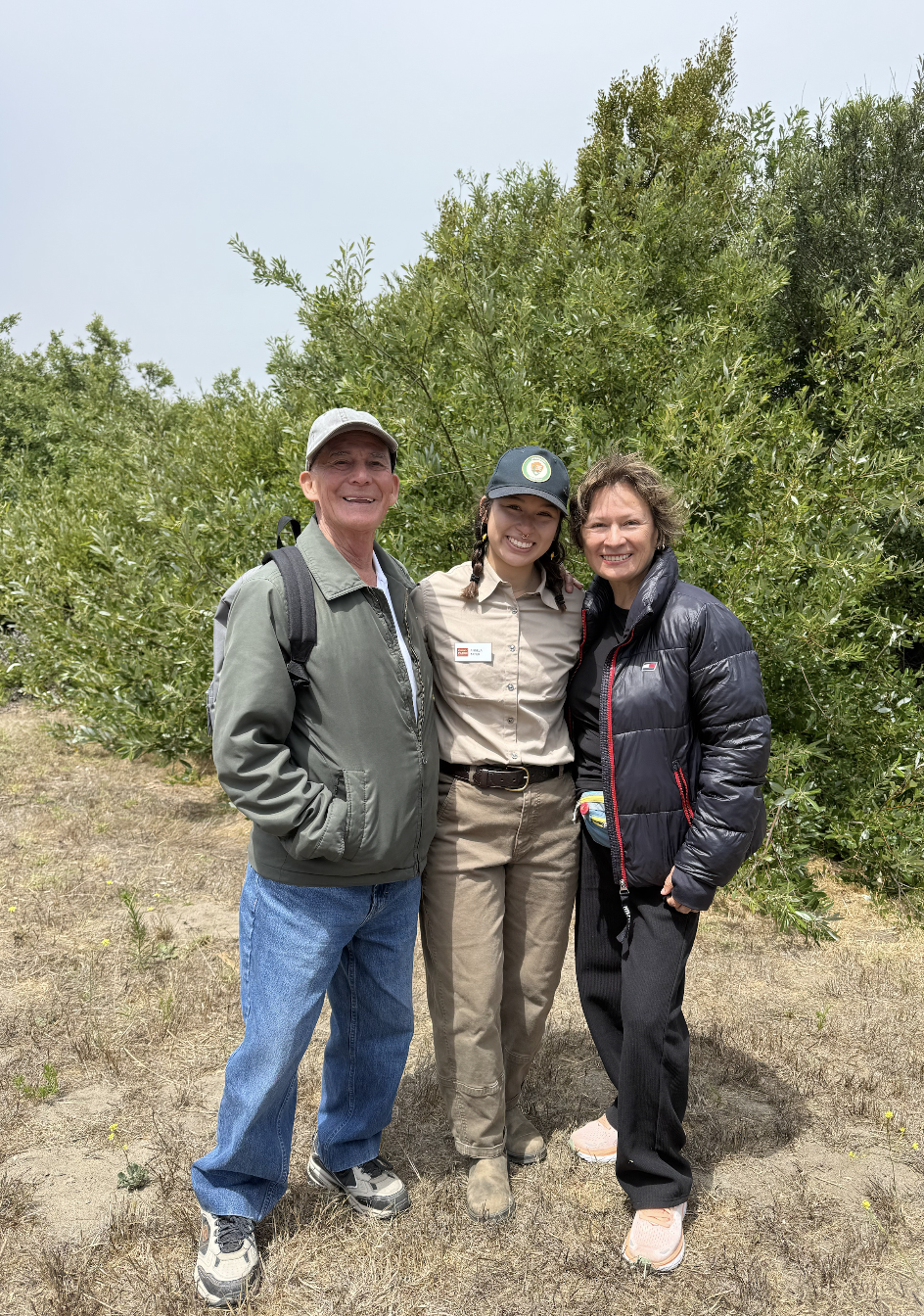
Angela Tafur with her parents, Jose and Carmen Tafur
“I believe my deep interest in ecosystems was shaped early on by my parents’ influence. As Peruvians, their connection to the natural world is rooted in a culture where nature and daily life are deeply intertwined — especially given Peru's diverse geography and rich array of ecosystems.”
—Angela Tafur
Angela is focused on expanding environmental knowledge and increasing access to outdoor spaces. She describes these as a personal and professional calling. “I’ve experienced firsthand how nature can be a source of profound healing — helping me navigate my disability (PTSD), process trauma, and build an intimate, restorative relationship with the world around me. Spending time in outdoor spaces has also allowed me to explore and connect with my mestiza identity and indigenous Peruvian ancestry. As I have learned about the complex histories of the natural spaces I visit, I continue to reflect on how colonialism has distanced me from my ancestral language, Quechua, and from ways of life connected with nature. Being in these landscapes feels like coming back home.”
Angela is currently the president of the Sierra Nevada Alliance of Gators (SNAG), a student organization that builds community through nature and advocates for continued access to SFSU’s Sierra Nevada Field Campus (SNFC), where she fundraises efforts to help students overcome financial barriers to attend. She also works as an outdoor trip leader and is a student manager for the Gator Outdoor Adventure (GOA) program, a branch of Campus Recreation at the Mashouf Wellness Center that provides accessible hiking, backpacking, camping, and climbing trips for students, faculty, and alumni. Notably, the “Gator Wild” program led by GOA was Angela’s first experience with camping and backpacking, as well as her introduction to the SNFC, a research and education field station dedicated to building inclusive community around teaching and learning in the natural sciences, land management, art, music, and culture, offering workshops, classes, and a home base for research at nearby field sites. SNFC’s reach extends beyond the SFSU community, serving as a research and education resource for the local communities of the northern Sierra Nevada, the general public of California, and beyond.
“I’ve experienced firsthand how nature can be a source of profound healing — helping me navigate my disability (PTSD), process trauma, and build an intimate, restorative relationship with the world around me. Spending time in outdoor spaces has also allowed me to explore and connect with my mestiza identity and indigenous Peruvian ancestry.”
—Angela Tafur
With transportation being a challenge for SFSU students to access the field campus and other outdoor spaces, Angela utilized her roles within SNAG and GOA to organize various low- and no-cost trips and public transit trips to SNFC and various National Park sites, California State Park sites, and regional parks; showing students that accessing the outdoors without a car is not only possible but empowering. “Having seen and experienced the transformative impact of outdoor programs firsthand, I now want to help others find that connection,” Angela said.
“I consider the work that I do a daily offering for the earth and environment around me. In highland Quechua cultures of Peru, making offerings to the Earth, known as Pachamama, is a deeply rooted indigenous tradition. It is more than just a career, it is a service I have dedicated myself to being a part of the interconnected, beautiful world that gives all of us water, sun, fire, earth, food, air. The least I can do is to give back for how the earth continues to take care of me, mirroring reciprocal and balanced relationships found across nature,” Angela says.
Prior to attending SFSU, Angela saw her interest in the environment flourish under the tutelage of a familiar SFSU face. “At Chabot College, my passion for geography was sparked by a professor — an SFSU geography and earth science alumnus (Suzanne Maher, ’09, ‘16) — who encouraged me to pursue the field,” said Angela. “From the moment I began applying to universities, I knew giving back to my community would be central to my path. That’s why I chose SFSU — to serve the Bay Area community that shaped me. I graduated with honors (from Chabot) and delivered the keynote speech at Latino Graduation Night, a defining moment as I transitioned to SFSU to earn my B.A. in geography.”
“From the moment I began applying to universities, I knew giving back to my community would be central to my path. That’s why I chose SFSU — to serve the Bay Area community that shaped me.”
—Angela Tafur
The Kirkeberg Scholarship, established by retired SFSU professor Max Kirkeberg and his husband, Gabriel Proo, is awarded annually to an SFSU School of the Environment undergraduate or graduate student whose studies and goals align with dedication to the lived and changing environment of the Bay Area.
Kirkeberg was born in Stanton, Iowa (“the Swedish capital of Iowa”), the only child of high school teachers. He made his way to San Francisco in 1965 as he was working on his Ph.D. thesis. He joined SFSU as a professor of Urban Geography and ultimately received tenure and emeritus tenure status. His most well-known class was Geography 454: "San Francisco on Foot,” which he taught for 30 years. He loved every day as a teacher.
Upon retirement, Kirkeberg continued teaching the class as a lecturer and offered it through the Osher Lifelong Learning Institute. He documented the urban geography of the San Francisco Bay Area in almost 60,000 slides taken over 50 years. His images of streets, architecture, development, landscapes, culture, and geographical highlights provide an encompassing picture of the diverse neighborhoods that make up San Francisco, as well as the features and regions beyond it in the greater Bay Area. The collection is available through DIVA, an open digital collections archive built and managed by Academic Technology at SFSU.
Kirkeberg was also the founder and leader of the St. Francis Lutheran Church and SFSU Geography Department AIDS Walk team, which ran from the 1980s to the 2020s, raising more than a million dollars for AIDS research and care, and often competing with the largest corporate teams for the top fundraising totals each year.
For more information about donating to the College of Science & Engineering, contact:
Holly Fincke
Senior Director of Development
College of Science & Engineering
(415) 338-7118
Tags

